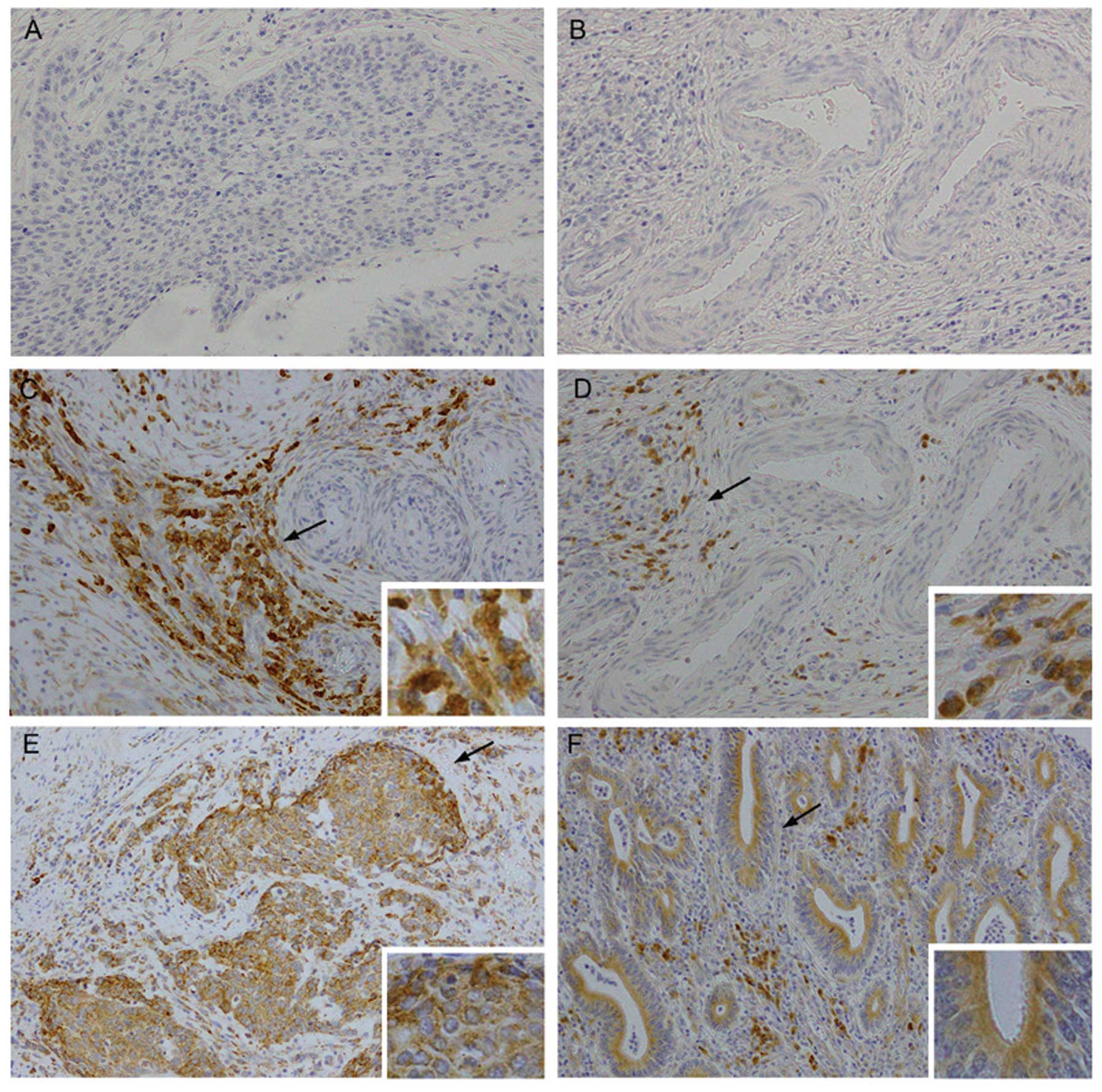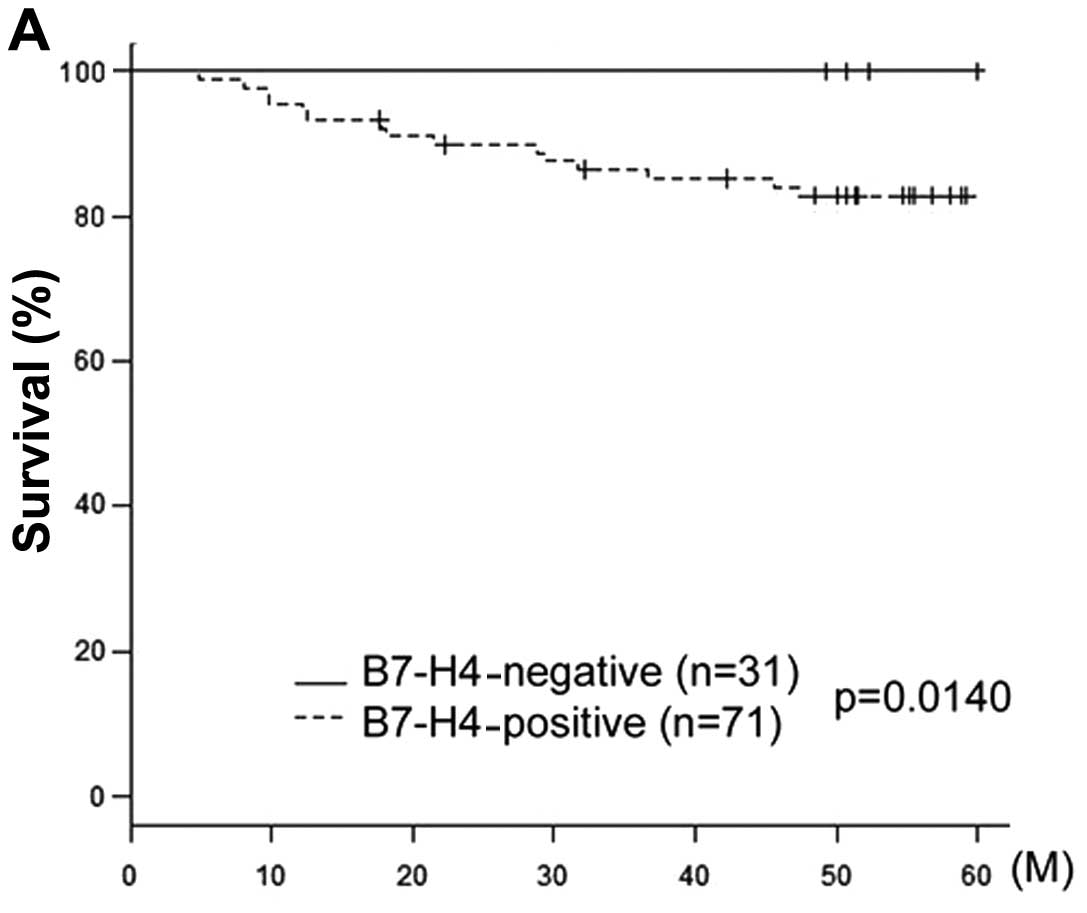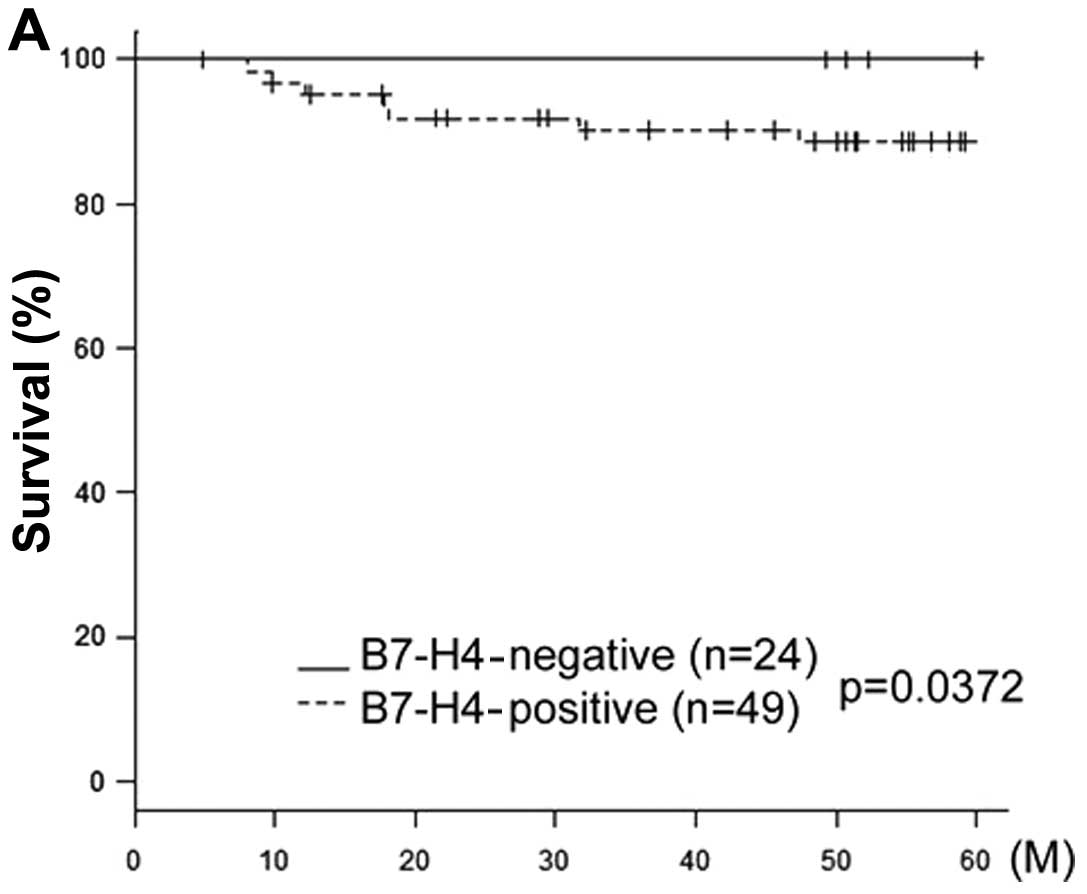|
1
|
Parkin DM, Bray F, Ferlay J and Pisani P:
Estimating the world cancer burden: Globocan 2000. Int J Cancer.
94:153–156. 2001. View
Article : Google Scholar : PubMed/NCBI
|
|
2
|
Shibata K, Kajiyama H, Ino K, et al: Twist
expression in patients with cervical cancer is associated with poor
disease outcome. Ann Oncol. 19:81–85. 2008. View Article : Google Scholar : PubMed/NCBI
|
|
3
|
Sica GL, Choi IH, Zhu G, et al: B7-H4, a
molecule of the B7 family, negatively regulates T cell immunity.
Immunity. 18:849–861. 2003. View Article : Google Scholar : PubMed/NCBI
|
|
4
|
Fauci JM, Straughn JM Jr, Ferrone S and
Buchsbaum DJ: A review of B7-H3 and B7-H4 immune molecules and
their role in ovarian cancer. Gynecol Oncol. 127:420–425. 2012.
View Article : Google Scholar : PubMed/NCBI
|
|
5
|
Prasad DV, Richards S, Mai XM and Dong C:
B7S1, a novel B7 family member that negatively regulates T cell
activation. Immunity. 18:863–873. 2003. View Article : Google Scholar : PubMed/NCBI
|
|
6
|
Zang X, Loke P, Kim J, Murphy K, Waitz R
and Allison JP: B7×: a widely expressed B7 family member that
inhibits T cell activation. Proc Natl Acad Sci USA.
100:10388–10392. 2003.
|
|
7
|
Krambeck AE, Thompson RH, Dong H, et al:
B7-H4 expression in renal cell carcinoma and tumor vasculature:
associations with cancer progression and survival. Proc Natl Acad
Sci USA. 103:10391–10396. 2006. View Article : Google Scholar : PubMed/NCBI
|
|
8
|
Kryczek I, Wei S, Zhu G, et al:
Relationship between B7-H4, regulatory T cells, and patient outcome
in human ovarian carcinoma. Cancer Res. 67:8900–8905. 2007.
View Article : Google Scholar : PubMed/NCBI
|
|
9
|
Salceda S, Tang T, Kmet M, et al: The
immunomodulatory protein B7-H4 is overexpressed in breast and
ovarian cancers and promotes epithelial cell transformation. Exp
Cell Res. 306:128–141. 2005. View Article : Google Scholar : PubMed/NCBI
|
|
10
|
Tringler B, Zhuo S, Pilkington G, et al:
B7-H4 is highly expressed in ductal and lobular breast cancer. Clin
Cancer Res. 11:1842–1848. 2005. View Article : Google Scholar : PubMed/NCBI
|
|
11
|
Tringler B, Liu W, Corral L, et al: B7-H4
overexpression in ovarian tumors. Gynecol Oncol. 100:44–52. 2006.
View Article : Google Scholar : PubMed/NCBI
|
|
12
|
Chen LJ, Sun J, Wu HY, et al: B7-H4
expression associates with cancer progression and predicts
patient’s survival in human esophageal squamous cell carcinoma.
Cancer Immunol Immunother. 60:1047–1055. 2011.PubMed/NCBI
|
|
13
|
Seliger B, Marincola FM, Ferrone S and
Abken H: The complex role of B7 molecules in tumor immunology.
Trends Mol Med. 14:550–559. 2008. View Article : Google Scholar : PubMed/NCBI
|
|
14
|
Quandt D, Fiedler E, Boettcher D, Marsch
WCh and Seliger B: B7-H4 expression in human melanoma: its
association with patients’ survival and antitumor immune response.
Clin Cancer Res. 17:3100–3111. 2011.PubMed/NCBI
|
|
15
|
Kryczek I, Zou L, Rodriguez P, et al:
B7-H4 expression identifies a novel suppressive macrophage
population in human ovarian carcinoma. J Exp Med. 203:871–881.
2006. View Article : Google Scholar : PubMed/NCBI
|
|
16
|
Miyatake T, Tringler B, Liu W, et al:
B7-H4 (DD-O110) is overexpressed in high risk uterine endometrioid
adenocarcinomas and inversely correlated with tumor T-cell
infiltration. Gynecol Oncol. 106:119–127. 2007. View Article : Google Scholar : PubMed/NCBI
|
|
17
|
Sun Y, Wang Y, Zhao J, et al: B7-H3 and
B7-H4 expression in non-small-cell lung cancer. Lung Cancer.
53:143–151. 2006. View Article : Google Scholar : PubMed/NCBI
|
|
18
|
Arigami T, Uenosono Y, Ishigami S,
Hagihara T, Haraguchi N and Natsugoe S: Clinical significance of
the B7-H4 coregulatory molecule as a novel prognostic marker in
gastric cancer. World J Surg. 35:2051–2057. 2011. View Article : Google Scholar : PubMed/NCBI
|
|
19
|
Simon I, Katsaros D, Rigault de la
Longrais I, et al: B7-H4 is over-expressed in early-stage ovarian
cancer and is independent of CA125 expression. Gynecol Oncol.
106:334–341. 2007. View Article : Google Scholar : PubMed/NCBI
|
|
20
|
Zang X, Thompson RH, Al-Ahmadie HA, et al:
B7-H3 and B7× are highly expressed in human prostate cancer and
associated with disease spread and poor outcome. Proc Natl Acad Sci
USA. 104:19458–19463. 2007.
|
|
21
|
Galazka K, Oplawski M, Windorbska W, et
al: The immunohistochemical analysis of antigens such as RCAS1 and
B7H4 in the cervical cancer nest and within the fibroblasts and
macrophages infiltrating the cancer microenvironment. Am J Reprod
Immunol. 68:85–93. 2012. View Article : Google Scholar : PubMed/NCBI
|
|
22
|
Awadallah NS, Shroyer KR, Langer DA, et
al: Detection of B7-H4 and p53 in pancreatic cancer: potential role
as a cytological diagnostic adjunct. Pancreas. 36:200–206. 2008.
View Article : Google Scholar : PubMed/NCBI
|
|
23
|
He C, Qiao H, Jiang H and Sun X: The
inhibitory role of B7-H4 in antitumor immunity: association with
cancer progression and survival. Clin Dev Immunol.
2011:6958342011.PubMed/NCBI
|
|
24
|
Cheng L, Jiang J, Gao R, et al: B7-H4
expression promotes tumorigenesis in ovarian cancer. Int J Gynecol
Cancer. 19:1481–1486. 2009. View Article : Google Scholar : PubMed/NCBI
|
|
25
|
Hofmeyer KA, Scandiuzzi L, Ghosh K,
Pirofski LA and Zang X: Tissue-expressed B7× affects the immune
response to and outcome of lethal pulmonary infection. J Immunol.
189:3054–3063. 2012.
|
|
26
|
McGrath MM and Najafian N: The role of
coinhibitory signaling pathways in transplantation and tolerance.
Front Immunol. 3:472012. View Article : Google Scholar : PubMed/NCBI
|
|
27
|
Wang X, Hao J, Metzger DL, et al: B7-H4
treatment of T cells inhibits ERK, JNK, p38, and AKT activation.
PLoS One. 7:e282322012. View Article : Google Scholar : PubMed/NCBI
|

















